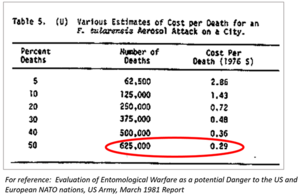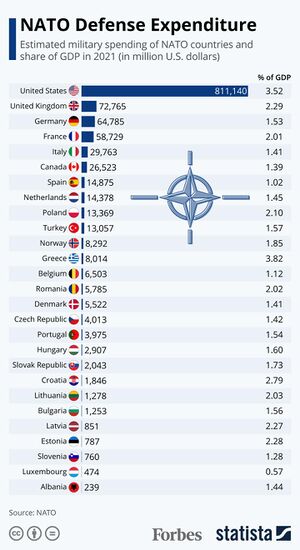History Of Nato
 From Conservapedia
From Conservapedia NATO was created at the behest of the United Kingdom to bypass deeply rooted American anti-interventionist sentiment to enter war without an Act of Congress, under the guise of "an attack against one is an attack against all." The UK had to wait 3 years during World War I and two years during World War II for the United States to bail the British Empire out of its war with Germany.
Specifically, NATO was created in 1947 allegedly to contain the expansion of single party leftwing Soviet Communism. But since the collapse of communism in Russia, NATO is globalism without a valid purpose. Unlike Germany which gained entrance two years after its founding, increasingly conservative Russia has been systematically denied membership in all European collective security arrangements.
Origins and mission creep[edit]
NATO originally was not part of President Franklin Roosevelt's 'Grand Design' for the post-World War II era, which included the United Nations and the International Monetary Fund. Roosevelt's original intention was to institutionalize the military alliance of the Big Three - the United States, the British Empire, and Russia - to keep the peace after the defeat of the Axis Powers. The failure of Soviet-communist occupied countries to adhere to the right of self-determination and hold elections caused the Angelo-American alliance to dust off the 1941 Atlantic Charter and formalize it into a treaty organization. By 1950, the United Nations was at war with itself, where the UN Security Council voted to send "UN troops" to combat the Soviet-backed North Korean regime, a Resolution the Soviet Union could have easily vetoed.
The NATO alliance is in no way a military adjunct arm of the UN Security Council, which progressives in government and fake news media attempted to create the illusion during the Obama administration's Libyan War. NATO was created to defend Europe, not to wage offensive war in Africa.
The North Atlantic Treaty Organization was established after the failure of the United Nations Organization to bring about democratic elections and "self determination of peoples" in Eastern Europe shortly after World War II in 1949. The original members consisted of ten European countries, the United States, and Canada. These countries formed the alliance to further the goal of security in the North Atlantic region, and they did this by ingraining the principal that an attack against one member would be considered an attack against all. Therefore, all would respond with support to the attacked nation. The first secretary-general of NATO, Lord Ismay, once quipped, NATO's purpose in Europe was “to keep the Russians out, the Americans in, and the Germans down."
NATO was created to short-circuit the delays the United States endured from domestic non-interventionists in entering two world wars on behalf of Great Britain. Should Britain perceive an attack again in the future, either from Germany or the Soviet Union, America would immediately be involved without any Congressional debate or public opinion polling. This is where the concept of "an attack against one is an attack against all" originated. Some critics quipped it effectively made Great Britain the 51st state.
In 1952 NATO began its first round of enlargement of the early alliance's history, letting in Greece and Turkey. By 1968, those two members were at war with each other.
In 1982 the Falklands War presented a special problem for NATO. When the United Kingdom perceived an attack against the Falkland Islands, it did not invoke Article 5. The Falkland Islands fell under the rubric of the Monroe Doctrine and other defensive alliances the United States has through the Organization of American States. Argentina claimed the Falklands as their own, and the United Kingdom sent an invasion fleet to "liberate" the English-speaking colony.
In 2006, Ivo H. Daalder, the current President of the Chicago Council on Global Affairs and previously the U.S. Permanent Representative on the Council of NATO (2009-2013), published with co-author James Goldgeier a proposal for a "Global NATO" in the globalist magazine Foreign Affairs.
NATO Members[edit]
Austria is a European country that never joined NATO.[1] Under the Austrian State Treaty (May 15, 1955), the Soviet Union withdrew its troops under the promise that Austria would declare its neutrality and remain a buffer between Western Europe and Eastern Europe.[2] This was the only treaty signed by both the Soviet Union and United States in the entire decade following the 1947 Paris Peace Treaties.
Nearly all of the remainder of Western Europe has joined NATO, with the additional exceptions (among large countries) of Switzerland, Ireland, Sweden, and Finland, though, following the Russian Federation's Special Operation in Ukraine, the latter two are reconsidering. Ireland belongs to the EU Battle group and has participated with some NATO led missions under a UN mandate. Support for joining Nato has increased recently in the Republic of Ireland
,| NATO Member | NATO Summit | Expansion Year |
|---|---|---|
| Belgium | Founder | Original Member, 1949 |
| Canada | Founder | Original Member, 1949 |
| Denmark | Founder | Original Member, 1949 |
| France | Founder | Original Member, 1949 |
| Iceland | Founder | Original Member, 1949 |
| Italy | Founder | Original Member, 1949 |
| Luxembourg | Founder | Original Member, 1949 |
| Netherlands | Founder | Original Member, 1949 |
| Norway | Founder | Original Member, 1949 |
| Portugal | Founder | Original Member, 1949 |
| United Kingdom | Founder | Original Member, 1949 |
| United States | Founder | Original Member, 1949 |
| Greece | First Round, 1952 | |
| Turkey | First Round, 1952 | |
| Germany | Second Round, 1955 | |
| Spain | Third Round, 1982 | |
| Czech Republic | Washington, D.C. | Fourth Round, 1999 |
| Hungary | Washington, D.C. | Fourth Round, 1999 |
| Poland | Washington, D.C. | Fourth Round, 1999 |
| Bulgaria | Washington, D.C. | Fifth Round, 2004 |
| Estonia | Istanbul, Turkey | Fifth Round, 2004 |
| Latvia | Istanbul, Turkey | Fifth Round, 2004 |
| Lithuania | Istanbul, Turkey | Fifth Round, 2004 |
| Romania | Istanbul, Turkey | Fifth Round, 2004 |
| Slovakia | Istanbul, Turkey | Fifth Round, 2004 |
| Slovenia | Istanbul, Turkey | Fifth Round, 2004 |
| Albania | Bucharest, Romania | Sixth Round, 2008 |
| Croatia | Bucharest, Romania | Sixth Round, 2008 |
| Montenegro | Seventh Round, 2017 |
Soviet reaction[edit]
The Angelo-American alliance acceptance of continental European countries led Soviet Russia in 1955 to set up a counter organization, The Warsaw Treaty Organization (or Warsaw Pact). Common defense, the ongoing MAD strategy, and economic crisis led the Soviet Union and the Warsaw Pact to its demise. NATO's transatlantic relations and prevention were key to the end of the Cold War, and the beginning of an interlinking of United States and European policies, which still remains to this day.
References[edit]
Categories: [Military Alliances] [NATO] [Diplomacy] [Cold War] [Afghanistan War] [Zelensky Regime] [Russia-Ukraine War] [Russophobia] [Globalism]
↧ Download as ZWI file | Last modified: 02/17/2023 04:51:57 | 76 views
☰ Source: https://www.conservapedia.com/History_of_NATO | License: CC BY-SA 3.0
 ZWI signed:
ZWI signed:

 KSF
KSF